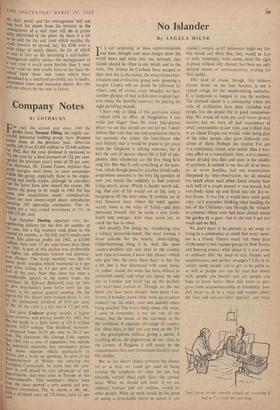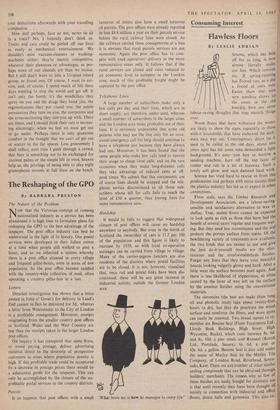No Islander
By ANGELA MILNE lT is not surprising, as mass communications and mass thought and mass danger draw the world more and more into one network, that islands should be often in our minds and in the news. The Tristan da Cunhans have escaped to their own dot in the ocean; the away-from-exter- mination-and-civilisation group now planning a sea-girt Utopia will no doubt be followed by others; and, of course, every Monday we have another glimpse of that well-known tropical fast- ness where the showbiz castaway ,sits playing his eight perishing records.
Ihave only to think of this particular island --Which with an effort of imagination I can make just bigger than the stock joke-picture place--to see that islands are not for me. 1 don't believe that with that size and population they're for anybody else either; the interviewee who says blithely that it would be grand to get away from the telephone is talking nonsense, for if he's the sort of person whose life is fullof tele- phones, then telephones are the first thing he'd long for. But that is only scratching at the ques- tion, which though posed by a rather trivial radio programme amounts to the very big question of how you would like suddenly to find yourself living utterly alone. Which is hardly worth ask- ing; that sort of life would not be life, only a hanging-on till the boat cattle. It reminds 'nfe of that Simenon story where the rebel against society hides in the wilds of Tahiti--and then persuades himself that be needs a new tooth- brush and emerges, with what. secret jay, to catch the bus to town.
But possibly I'm doing my shuddering over a solitary housewife-lunch; like most women, I know solitude for the beastly, clock-ticking, fridge-humming thing it is. And, like most country-dwellers who mix time in the country with time in London, I know that silence—which also gets into the news these days—is fine for a bit, but is best alternated with some noise; or. rather, sound, for noise has been defined as unwanted sound, and when you spend the odd day in London you fairly lap up the decibels you have been starved of. Though, on the one hand, you hear more sharply—how many Lon- doners, I wonder, know what noise an escalator makes?—on the other, your ears actively enjoy being assailed. The worst thing about city noise, I seem to remember, is not the roar of the streets, but the boom of the television in the flat -overhead. A supreme advantage of country life, these days, is that you can turn on the TV or the gramophone without giving a damn; if anything drives the populations of our cities to the corners of England it will surely be the canned noises they now (sometimes literally) wear like clothes.
But on our desert island, however the silence hit us at first, we could get used to being without the telephone or—after the sun had blessedly warped those eight discs—the canned noise. What we should still need, if we are ordinary humans and not recluses, would be other people. What on earth would, be the good, of seeing a remarkable beetle or sunset if you couldn't remark on it? Introverts might say that this would suit them fine, they would be free to note, remember, write down, draw the sight in peace without silly chatter; but these are only delayed means of communication, waiting for their public.
This kind of island, though, this hideous picture thrust on the lone luncher, is not a typical refuge for the island-seeking mentality. It is supposed to happen to you by accident. The planned island is a community where the evils of civilisation have been excluded and people live the simple life in good companion- ship. We would all wish any such brave project success—but we have all had experiences of small communities in our time, and 1 think that in an island Utopia one would, while being glad of the other people, also grow hideously con- scious of them. Perhaps the nearest I've got to a community island, even nearer than a war- time office or a transatlantic liner, was a country house divided into flats and sited in the middle of nowhere. It seemed to me that all of us there, six or seven families, had our eccentricities sharpened by inter-observation; we all minded too much about each other, knew exactly how each half of a couple bossed or was bossed, had everybody sized up and fitted into the day-to- day drama. It was fun, it would have made good copy—as I remember thinking when handing the last of the Christmas rum through the window to someone whose aunt had been chased round the garden by a goat-- but in the end it got too much and we fled.
We don't have to be gloomy to sec snags to living in a community so small that every mem- ber is a friend. There's much talk these days of the need to mix income-groups in New Towns - and housing estates; what about (if it ever arose in ordinary life) the need to mix friends and acquaintances and perfect strangers? Life in its variety needs people you've got to be polite to as well as people you can let your hair down with, people you haven't met yet, people you hope to know better. How dull never to pro- gress from acquaintanceship to friendship; bow dull never to sit in a train and wonder about.. the face and suitcase-label opposite, and swap lust li:o.fw to the trrribie. attack of coughing I had at 2 o'clock this morning.' your deductions afterwards with your travelling companion. . . .
How dull perhaps, face or not, never to sit in a train? No, I honestly don't think so. Trains and cars could be peeled off our lives as easily as mechanical entertainment. We shouldn't miss vacuum-cleaners or washing- machines either; they're merely competitive, whatever their pleasures or advantages, as per- haps more of our chattels are than we realise. But I still don't want to join a Utopian island group, or found one. Of course, I want to sur- vive, and, of course, I spend much of life these days wanting to stop the world and get off. It isn't only the bomb, its the weedkillers they spray on you and the drugs they hand you, the regimentations they put round you, the subtle persuasions they turn on you, the computers and the cross-sectioning they size you up with. There are times, and I should think their rate is increas- ing alarmingly, when we feel we must get out or go under. Perhaps there is only gruesome comfort in the thought that we can't all get out or scatter to the far spaces. Less gruesomely I shall reflect, next time I push through a crowd, that here is something not to be exchanged for coconut palms or the simple life or even, heaven help us, the privilege of being able to play eight gramophone records at full blast on the beach.



































 Previous page
Previous page